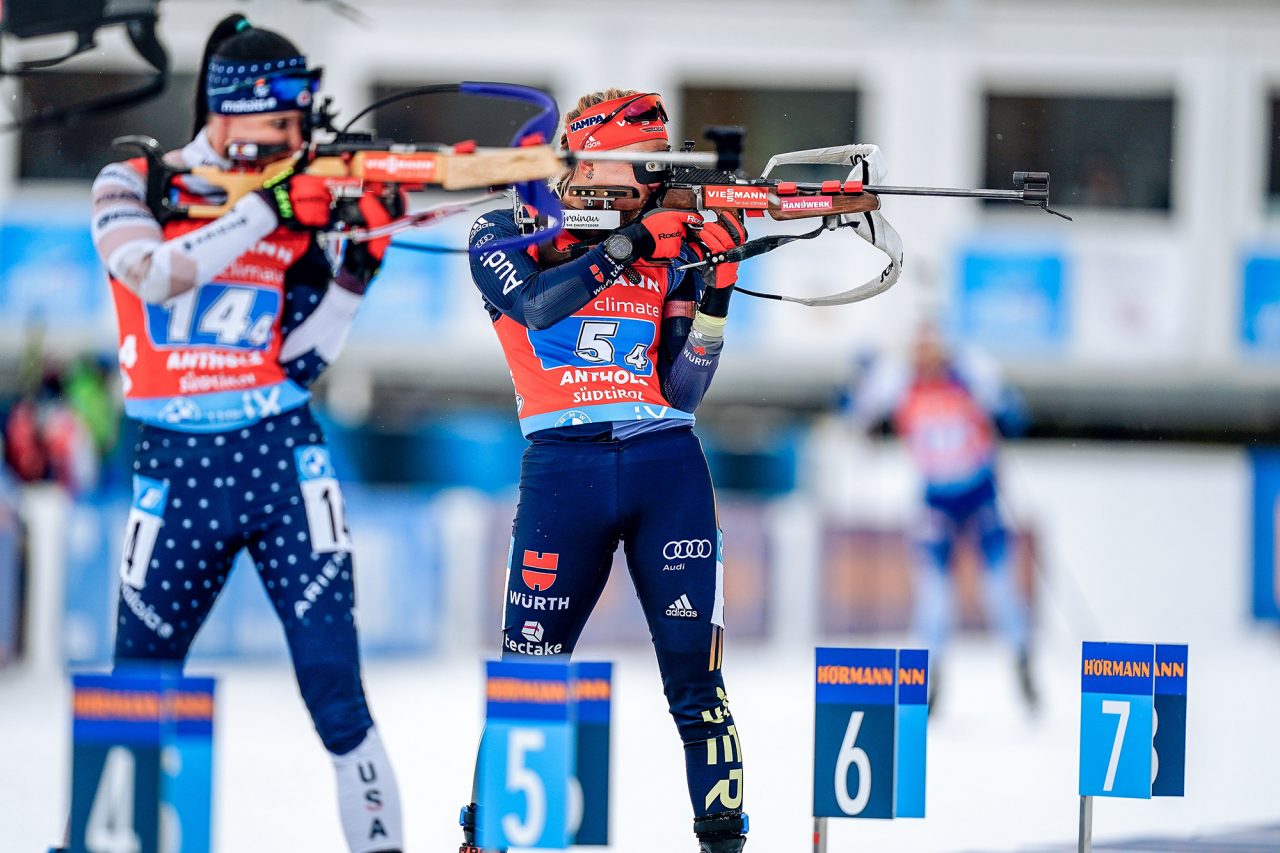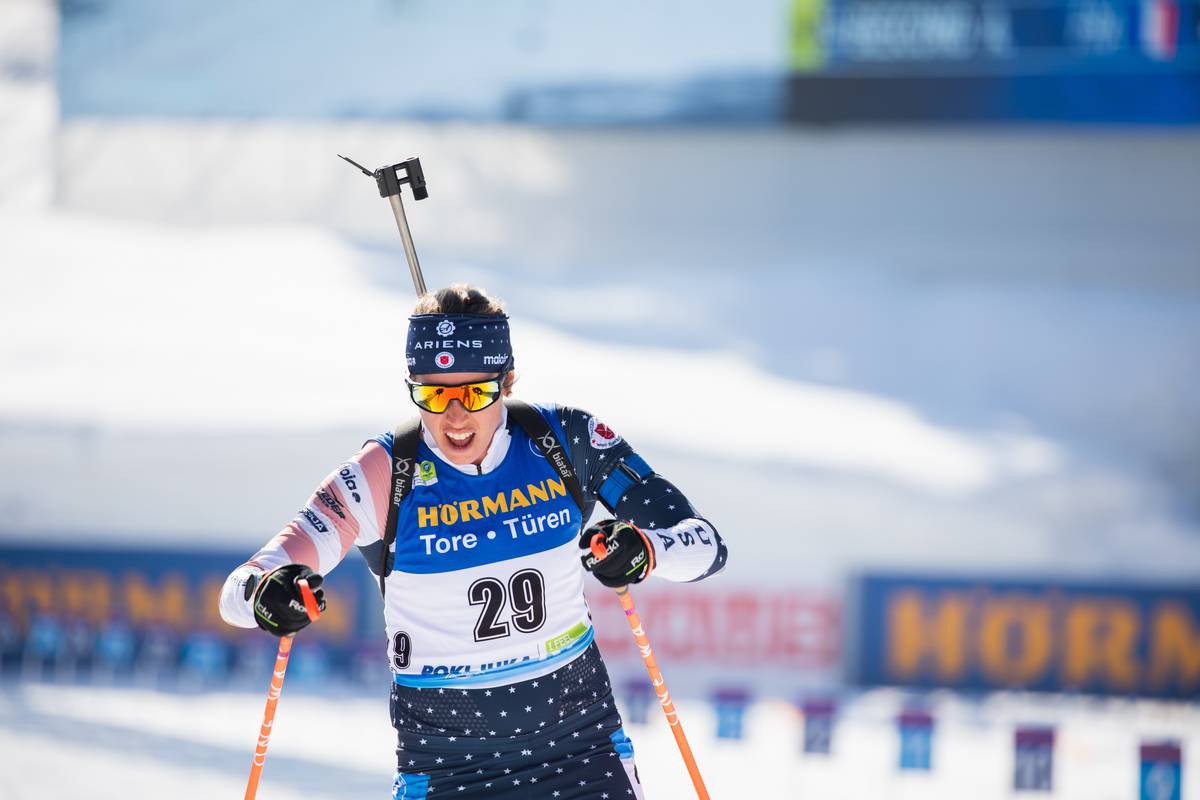
Hanna Kebinger (GER) – IBU World Cup Biathlon, relay women, Antholz (ITA). www.nordicfocus.com. © Thibaut/NordicFocus. Every downloaded picture is fee-liable.
Biathlon is not the kind of sport for the faint-hearted. It takes a lot of effort, perseverance, and consistency to become adept at it. It is also an injury-prone type of sport. Research shows that biathletes have more low back injuries than other athletes pursuing other types of winter sports.
All the more reason to plan the educational and training process of a beginner biathlete strategically and methodically to lay the foundation for balanced and result-oriented growth. The entire process of preparations before biathletes can start their professional careers span a long period of time. It starts when students are about 8 years old and goes through 5 different phases until they turn 20-21. Let’s take a look at all 5 phases in greater detail.
Phase 1. Learning the ropes
This is the very first phase spanning a 4-5 year time period. Students are 8-12 years old in this phase. It is also when they get their exposure to the sport. Therefore, it is absolutely necessary that students feel comfortable with the degree of their involvement and that the whole experience is fun. If the learning process is managed professionally, biathlon can boost children’s athletic and mental skills.
Students’ young bodies are developing very rapidly at this stage in their lives, and it’s relatively easier for them to develop rhythm and balance, which are key to success in biathlon. Children start learning the basics of controlled skiing and rifle safety.
This is when they start seeing the role of sports in education as training helps them deal with their school assignments. These skills also help them achieve their educational objectives in school. Coaches and teachers have an important role in helping kids see the connection.
Phase 2. Starting to train
This stage is also called the technical and physical training period. It involves 13-14 year-olds. Children’s bodies are now ready to take on different types of endurance training exercises. They start biking, running, hiking, and skiing activities. Skiing exercises become more intensive. Light strength training is also added to the mix.
Children are now prepared to understand how to deal with failure, accept its imminence, build resilience, and learn how to turn setbacks into opportunities.
Phase 3. Training harder
In phase 3, 15-16-year-old teenagers make physical training their top priority. They get into a larger number of endurance training exercises and systematized progression. Coaches introduce the concepts of perceived effort scale, training logs, and the right nutrition for optimal results and quick recovery.
This is a pivotal phase because trainees are introduced to sanding shooting. They start using a cuff and sling to shoot in the prone position. Shooting drills involved high-intensity activities, as young athletes learn how to shoot with their heart rate going up.
Phase 4. Competing harder
Now is the time for Junior racing and competition involving 17-20-year-old rookies. The total volume of training goes up as both coaches and their trainees up the game. Young bodies are now physiologically ready to develop aerobic capacity. Coaches now aim to ensure consistent progression and higher levels of performance.
Students who want to train as professional biathletes need to strike a good balance between studies and training. That’s why they are often buying research papers to save time on academic writing. Professional writers make sure they get high-quality papers for submission to their colleges.
The intensity of training increases to 2-4 times a week. Athletes are now required to shoot like real pros. Drills imitate real-life competitions, and participants’ skills are put to the utmost test. Positive self-talk, coaches’ per talk, and mental preparation come into play as integral parts of the overall training program.

Susan Dunklee (USA) – IBU World Championships Biathlon, mass women, Pokljuka (SLO). www.nordicfocus.com. © Manzoni/NordicFocus. Every downloaded picture is fee-liable.
Phase 5. Turning pro
This phase ushers in a long professional career for athletes aged 21 and more. It cannot get more serious than this. High-pressure environments, abnormal physical and psychological pressure, and ultimate tests on athletes’ stamina and endurance become part and parcel of everyday training and competitions.
This is also when many athletes’ workload sometimes becomes too large to manage. They get research paper help not to let things get out of control. It’s tough to focus on your training if you are sinking into the mire of challenging college assignments.
This is when athletes must be ready to hit international arenas and demonstrate their world-class skills. This is also when long hours of your training start yielding results.
Aiming High
Biathlon is a tough and demanding sport, and it requires a lot of dedication, persistence, and concentration from athletes. The training process starts when future athletes are very young. They go through a sequence of phases, and all phases must be carefully planned to achieve maximum and optimal results.
Coaches and tutors play pivotal roles in guiding athletes on this stressful and challenging journey. When all parties involved work together toward shared goals, athletes see tangible results in both their educational and training endeavors.
***
Diane Sherron is a popular sports commentator and popular blogger. She takes a particular interest in winter sports. Diane’s reviews and updates have guided a host of beginner athletes through their challenging college years toward successful professional careers.
